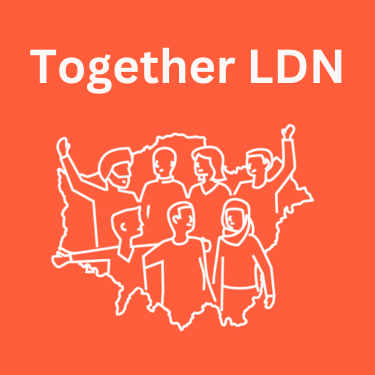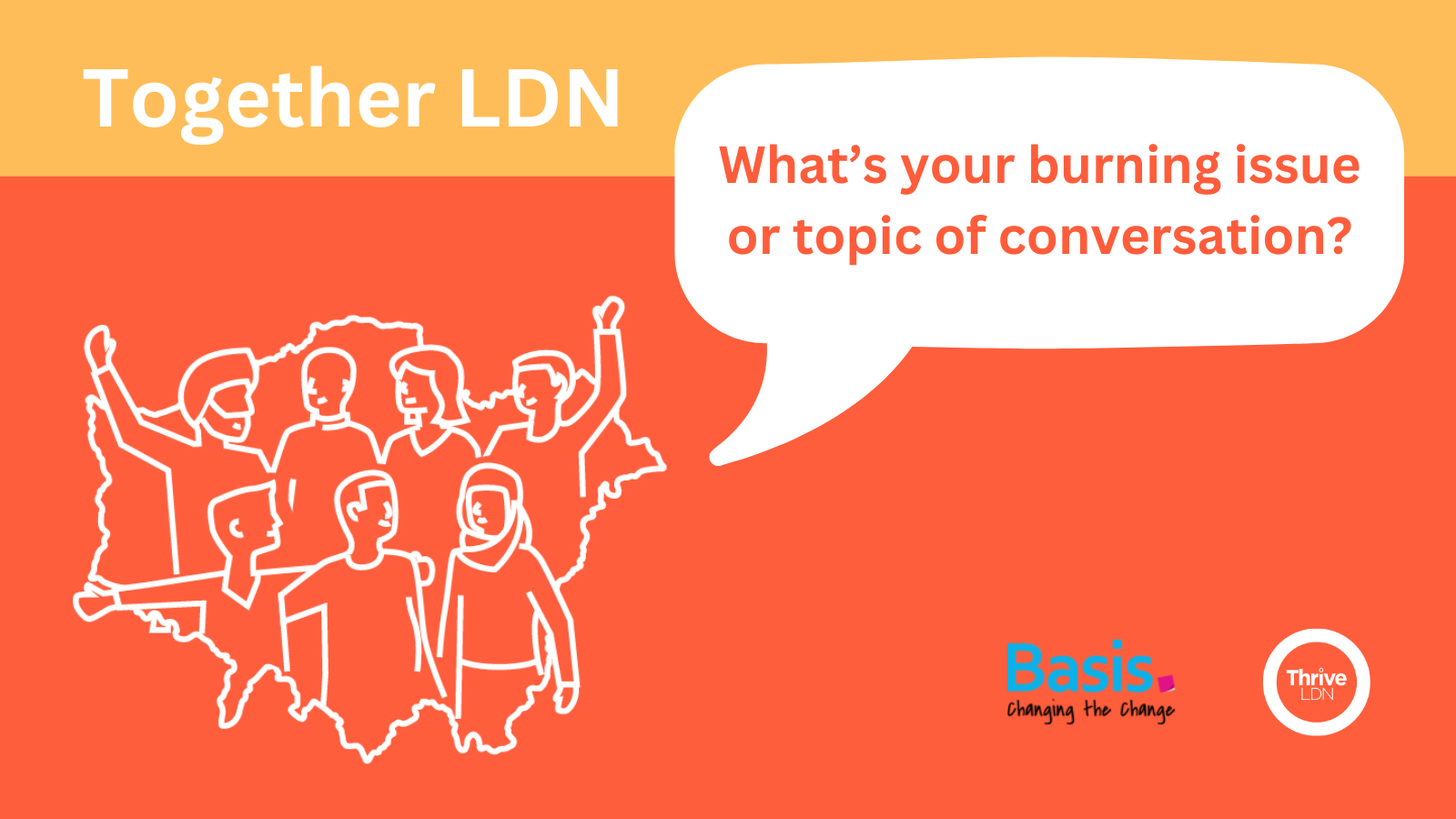
Stronger together at the Together LDN unconference


“So much optimism for change and willingness to work together. Thank you!”
“[The event] exceeded expectations – it was really broke down hierarchies, facilitated conversations between all on an equal basis and was engaging.”
Thrive LDN held its first online Together LDN unconference online on Tuesday 12 March.
It was a new format for us, where instead of a set agenda, participants suggested and selected the conversations that mattered to them.
We were delighted that 100 people with a professional or personal interest in mental health and wellbeing joined us throughout the event, sharing our belief that staying connected is more important than ever.
This initiative was funded by the Mayor of London and delivered in collaboration with Basis, who expertly hosted the technology to bring it all together.
As people registered for the event, we asked them to send us ideas for conversations. Asking them to think about what their burning issue or topic of discussion would be. We were inundated with ideas.
As we started the event, participants were asked to vote on the topics that resonated most with them. We had an array of topics to talk about, from supporting young people to mental health in the workplace.
During the conversations, attendees were able to hop around breakout rooms and topics, just like an in-person conference. There was even a lobby available for catch ups with contacts outside the conversation rooms. Across the afternoon four conversation sessions were held, some in groups of up to 15 whilst some conversations were more intimate between groups of three or four. Here is just some of what we covered:
Co-production
Men and mental health
Cultural integration in services
Supporting young people/mental health in schools
Workplace mental health
Effective communication
Funding and collaboration
Social isolation
Climate and mental health
Health inequalities
We outline some of the high-level conversation behind these topics below. Additionally, we are currently analysing the feedback from those who attended to see how we can enhance this format if we were able to repeat it.
Overall, we were delighted with how the event worked. It was a new approach for all of us but with Basis’ enthusiastic facilitation being energetically received by participants, the afternoon flowed and ran well.
“That was a fantastic event. I came back to the consortium team really excited by both by the conversations I’d had and also the format. It created such a dynamic environment for conversation.” Member of the LBGT+ Consortium
So much was discussed and shared, but a few key themes emerged over the day across all conversation topics.
Many Together LDN participants were from smaller community organisations, and funding constraints and staff wellbeing challenges have taken their toll. The importance of events such as this was highlighted in many sessions as a way of supporting collaboration and emphasising how connecting with each other remains a priority for smaller organisations.
All wanted to see things done better; with more compassion, empathy and understanding. From evaluating funding bids, to supporting teachers, to being truly integrated, the one thing that our discussions had in common was the need to be more understanding of each other as individuals and communities.
Finally, when times are difficult, our community organisations across London are innovating and developing creative ways to meet many challenges. There was a hunger for ideas and new ways to engage, work and thrive.
You can read more about some of our conversations below. And to participate in future events and similar activities, sign up to Thrive LDN’s e-newsletter to keep up to date.
Were you there? Let us know what you thought and how we can improve the experience next time by emailing info@thriveldn.co.uk.
Together LDN conversations. A summary of shared ideas.
The Thrive LDN team was scattered across Together LDN conversation rooms to pick up on the big themes of the day.
So much was covered that this is just a snapshot of what we heard. It’s clear that attendees made the most of the time which the unconference format offered to share some exciting ideas, innovations, and collaborations.
Co-production
A member of the London Borough of Newham’s public health team, who works as a peer research manager, suggested and led a conversation around co-production. It was a well-attended and lively room where much of the initial discussion focused on a shared definition of co-production. True co-production takes time, resource and focus to avoid being a tick-box exercise.
Storytelling was discussed as a powerful way to co-produce, creating an impact that cannot come from statistics alone.
Some attendees talked about their own efforts with what they hoped would be true co-production, but which petered off over time without contributing to real change. It is especially difficult for organisations on a yearly funding cycle to set up sustainable co-production models and processes.
One important point was raised and stuck with those in the room: if you’re only after feedback then you’ve missed co-production entirely.
Supporting young people
‘We need to reinvent the whole thing’ was the comment that kicked off the conversation, in a call for drastic change in supporting young people. Everyone in the room accepted the immense pressure on education and teachers and wanted the discussion to be about ways to help – not add to their pressure.
Creativity is important to wellbeing and improving access to creative activities inside and outside schools is needed. But a representative from Lewisham Youth Theatre, who work with hundreds of young people every year, talked about how they are underfunded and oversubscribed.
Teaching emotional literacy, empathy and relationship building may help young people to support each other. Real skills for life, including financial resilience, should also be part of school life.
Wellbeing in the workplace
This conversation was suggested by a participant who had experienced recent bereavement and was based around his own lived experience of support received in the workplace. Which was noted as not always the norm.
Everyone agreed on the importance of being able to be open about grief in the workplace and to have space (physical and emotional) to process that grief. And time to grieve, as grief doesn’t have a cut-off point.
The conversation moved into discussions about compassion, stigma and leadership. People cannot be open unless they know that they will receive a compassionate response.
We talked about Mental Health First Aid training for peer-to-peer support and the growth of Grief or Bereavement cafes where a safe space is available without stigma or judgement.
Mental health and men
This important conversation covered the many factors involved in supporting men’s mental health. Key to reaching and engaging men continues to be going to where they are already, rather than expecting them to come too you/a service.
Mind in Bexley shared a campaign to engage with local barbers, to ask them to host mental health leaflets in their shops.
Christians Against Poverty focused on the need to talk about poverty and mental health – looking at the pressure of finances, particularly if the man is the main jobholder for the family.
Consider the language used to approach mental health with men too (and men in different communities), perhaps looking at the holistic benefits of good mental health and the wider impact this has on the body physically.
Health Inequalities
With such a big topic the conversation was quite wide ranging, drawing upon the direct experiences or areas of work for those engaging in the room.
Within the round of discussion money and mental health was explored in the context of cost-of-living pressures causing greater inequalities. With relevant points from Clean Slate, highlighting that the distinction between offering ‘money guidance’ and ‘money advice’ is about coaching. Enabling people to feel they can ‘do’ and giving them options, helping them prioritise, making sure people know what their options, which naturally all links into health outcomes and disparity in opportunities for people.
There was agreement that in the health and voluntary sectors there is too much silo ways of working. Ultimately people rarely know what they need to know, for too long now they’ve been left out of the conversation which is growing inequalities.
There was also a discussion about the need to upskill staff and services to be better communicate with under-reached groups. As well as an interesting debate on whether peer to peer delivery improves or creates divisions within communities.
Cultural integration
Participants in this conversation agree that we need nuanced approaches to engaging with different communities to help overcome cultural and linguistic barriers. ‘We can’t all learn thousands of cultures’, said one participant, so we need to work directly with people who understand each culture.
Club Harley is an organisation that works with South Asian and LGBT community; they have devised rules about creating a safe space for attendees due to stigma in this community around mental health.
We talked about how we can measure cultural integration. Ideas included through access to and uptake of services. It is important to bring people from communities on board to help design your services too, to build trust in communities that may be wary of healthcare services.
Some other ideas for engagement included using theatre methodologies/rehearsals to speak about problems in a contained way; creative strategies to encourage feedback, such as QR codes, emojis, feedback boxes, post-it notes.
Home for Now is a preventative project supporting asylum seekers and refugees to move from publicly funded accommodation to privately owned accommodation. They shared the importance of listening, having points of review so that approach can be adapted as you go.
Climate x Mental Health
Even though public discourse continues to be sceptical, everyone in this conversation agreed that there is a real impact on young people and that this is a real crisis.
We talked about the impact of recent heatwaves in London on temperatures in the home and the impact of floods on people and communities.
There was concern from some about how the issue can be classed as ‘political’ – and how can we change hearts and minds that this is a social and health/wellbeing issue.
The impact of small actions, that we can all do, may help to alleviate the feelings of crisis and being out of control.
Collaborating and funding
Funding is an ongoing pressure for many attendees. There was a sense that what funders want is not progressing/adapting to how organisations now work.
People were keen to explore ways that smaller organisations can collaborate to share ideas, resources and come together to apply for larger funding poots. Some discussed a similar format to Together LDN to allow this collaboration to happen.
Resilience and wellbeing in organisations remain challenging to manage and supporting staff to ‘keep going’ is a priority for many.
Effective communications
Discussions revolved around knowing the audience and reflecting what they need – not what we want to say. The importance of stories over statistics was talked about here too, as in other sessions – and how we as a sector can convince funders of the power of stories.